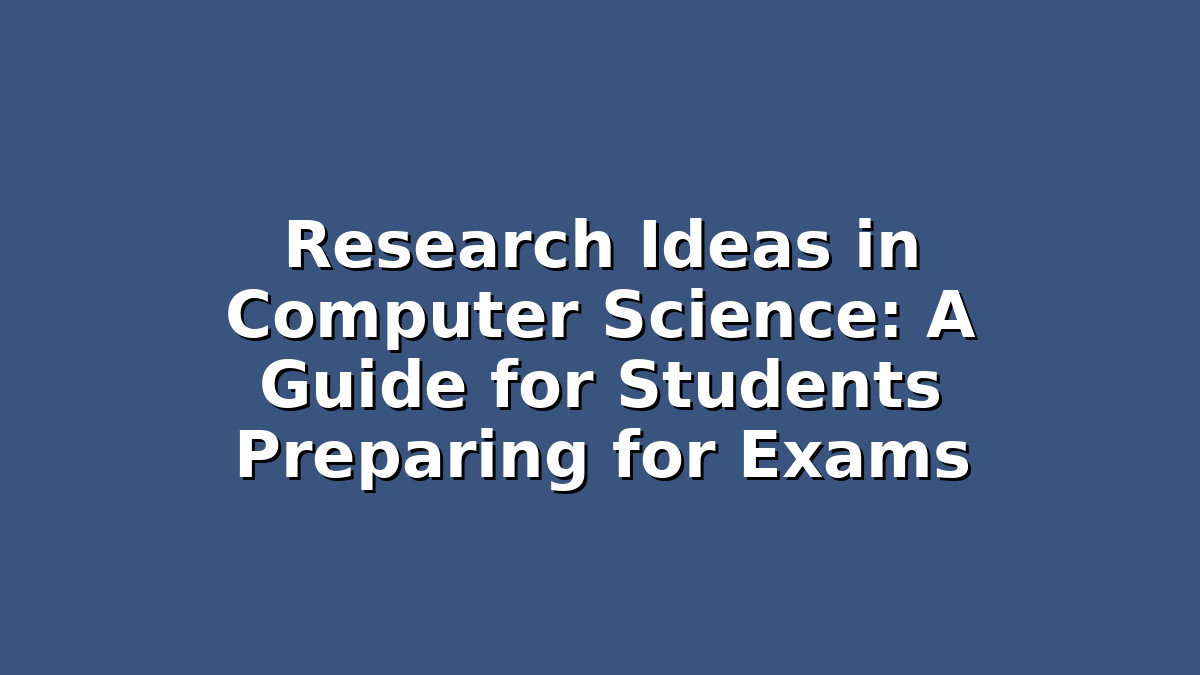Preparing for exams in computer science can be both exciting and challenging. Whether you are in high school, college, or pursuing advanced studies, exploring research ideas can deepen your understanding of the subject and boost your confidence during exam preparation. Not only does engaging with research topics help you grasp theoretical concepts, but it also encourages critical thinking, problem-solving, and practical application—skills that are invaluable for exams and beyond. In this article, we’ll explore some compelling research ideas in computer science and provide study-related advice to help you make the most of your preparation journey.
1. Exploring Emerging Fields in Computer Science
The field of computer science is vast, constantly evolving with new technologies and methodologies. Staying updated with emerging areas can give you an edge in understanding current trends and potential future developments. Here are some exciting research ideas you can explore:
#### Artificial Intelligence and Machine Learning
AI and machine learning continue to revolutionize industries. Research topics like natural language processing, computer vision, or reinforcement learning allow you to explore how machines can learn from data and improve over time. For exam preparation, understanding the basics of algorithms, data sets, and evaluation metrics will solidify your foundation. Try to work on small projects or use online platforms like Google Colab to experiment with pre-built models.
#### Cybersecurity and Ethical Hacking
With the increase in digital information, cybersecurity is more critical than ever. Research ideas include studying encryption techniques, network security, or ethical hacking methods. Preparing for exams in this area means mastering concepts like cryptographic algorithms, firewall configurations, and threat analysis. Engage with interactive labs or simulation tools to get hands-on experience, which will make complex topics easier to recall during exams.
#### Quantum Computing
Though still in its early stages, quantum computing promises to reshape computational capabilities. Research topics might involve quantum algorithms, qubit technologies, or quantum cryptography. While this is an advanced topic, understanding core principles such as superposition and entanglement can help you stand out. Use visual aids and analogies to grasp these abstract concepts, and relate them back to classical computing principles you already know.
Study Tip: When researching emerging fields, balance theory with practice. Use online courses, tutorials, and coding challenges to reinforce learning. Break down complex concepts into manageable segments, and regularly review your notes to stay confident.
2. Focusing on Core Algorithms and Data Structures
Algorithms and data structures are the backbone of computer science. Many exams heavily test your understanding of these foundational topics. Diving deeper into algorithmic research can enhance your problem-solving skills and exam performance.
#### Algorithm Optimization
Research ideas can include studying sorting algorithms, searching algorithms, or graph traversal techniques. Learn how to analyze time and space complexity using Big O notation. Try to understand why certain algorithms perform better in specific scenarios. For instance, compare QuickSort and MergeSort on different datasets, and learn trade-offs between them.
#### Advanced Data Structures
Beyond arrays and linked lists, explore trees, heaps, hash tables, and graphs. Research the use cases and implementation of structures like AVL trees, B-trees, or tries. Knowing when and how to use these data structures can sharpen your coding answers and theoretical knowledge.
#### Algorithmic Problem Solving
Engage with competitive programming problems or research classic challenges like the Traveling Salesman Problem, knapsack problem, or dynamic programming puzzles. These problems improve your analytical thinking and help you develop efficient solutions under time constraints, mirroring exam conditions.
Study Tip: Practice is key when it comes to algorithms and data structures. Use platforms like LeetCode, HackerRank, or Codeforces to solve problems daily. Create summary sheets of common algorithms, their complexities, and example problems for quick revision before exams.
3. Integrating Software Development and Practical Applications
Computer science isn’t just theory—it’s about building systems and solving real-world problems. Researching software development practices and applications can make your learning more tangible and enjoyable.
#### Software Engineering Methodologies
Look into Agile, Scrum, or DevOps practices and how they improve software project management. Study the software development life cycle (SDLC) and version control systems like Git. Understanding these methodologies can help you answer scenario-based questions in exams and prepare you for collaborative work environments.
#### Mobile and Web Development
Research frameworks and programming languages used in app and website creation. Topics like responsive design, API integration, and client-server architecture are great for understanding system interaction. Try developing a small app or website as a project; this hands-on experience strengthens your grasp of coding concepts and problem-solving strategies.
#### Human-Computer Interaction (HCI)
Explore how design affects user experience (UX) and usability. Research topics include interface design principles, accessibility, and user testing. Knowing HCI can help you answer questions about technology adoption and software design, often covered in exams.
Study Tip: Apply what you learn by building mini-projects. Document your process and challenges, which can serve as study notes. Collaborate with peers or join coding clubs to gain different perspectives and boost motivation.
Conclusion
Researching ideas in computer science offers a powerful way to enhance your exam preparation. By diving into emerging fields, mastering algorithms and data structures, and embracing practical software development skills, you build a comprehensive understanding that goes beyond memorization. Remember, consistent practice, active engagement with material, and applying concepts through projects or problem-solving will keep you motivated and confident.
Exam success in computer science comes from curiosity and perseverance. Use research not only to prepare for tests but to ignite your passion for learning. With dedication, you’ll find that mastering computer science concepts becomes both achievable and rewarding.
Good luck with your studies—you’re capable of great things!

Responses